Three Chinese-owned fishmeal factories have opened in the Gambia since 2016, sparking tensions over allegations of competition with local fishers, overfishing, illegal fishing, and pollution.In the town of Sanyang, unresolved disputes with the Nessim Trading fishmeal factory reached a flashpoint on March 15, triggered by the stabbing death of a Sanyang resident, allegedly by a Senegalese worker at the factory.Hundreds of people took to the streets in protest, some of them torching the local police station and the fishmeal factory, and destroying boats and equipment belonging to Senegalese fishers.The violence drove more than 250 Senegalese residents to flee to the nearby town of Batakonko.
Residents of the Gambian coastal town of Sanyang say life has gotten harder since a fishmeal plant set up production in 2017.
Growing tensions over unresolved disputes with the factory reached a flashpoint on March 15, when hundreds of people took to the streets in protest. Some of the protesters set trucks and tires ablaze and destroyed a score of fishing boats and thousands of fishing nets. The destruction escalated into the torching of Sanyang’s police station, along with the fishmeal factory, run by Chinese-owned Nessim Trading.
The trigger for the unrest was the stabbing death of 33-year-old Sanyang resident Gibril Ceesay on March 14. A Senegalese national who reportedly worked at the Nessim factory allegedly broke into Ceesay’s home at night with the intention of stealing, killing Ceesay and seriously wounding his brother.
“We are protesting in Sanyang because of so many reasons,” Muhammed Jabang, 22, told Mongabay. “If not because of the fishmeal factory, he [the alleged perpetrator] wouldn’t have been in Sanyang,” said Jabang, who attended the protest but said he was not involved in damaging property.
“The situation of the fishmeal factory is a concern for everyone. Fishmeal is taking lots of fish to feed animals, leaving locals without fish for protein,” he added.
The Nessim fishmeal factory in Sanyang. Image by Mustapha Manneh.
The fishmeal industry has boomed in West Africa in recent years, targeting the same small pelagic fish, predominantly bonga (Ethmalosa fimbriata) and round and flat sardinella (Sardinella aurita and S. maderensis), that are the mainstay for artisanal fishers, who cast nets from wooden pirogues.
Protesters in Sanyang destroyed boats and equipment belonging to Senegalese fishers, and clashes between the communities broke out at pirogue-landing sites.
Settlers from neighboring Senegal have long lived in the Gambia’s fishing communities, sharing tribal and language connections. In recent years, however, the migrant population has increased because the three Chinese-owned fishmeal factories operating since 2016 and 2017 along the Gambia’s short stretch of coast have favored hiring Senegalese fishers and staff over locals.
The violence drove more than 250 Senegalese residents to flee to the nearby town of Batakonko.
“Many of us left with our family for safety,” a Senegalese fisherman, who did not want to be named, told Mongabay in Batakonko. “All our fishing materials, nets, boats and boat engines were set ablaze. I cannot say the amount of loss this incident has brought to us, but it’s really a mess.
“I pray such violence never occurs again because Gambian and Senegalese are one people,” he added.
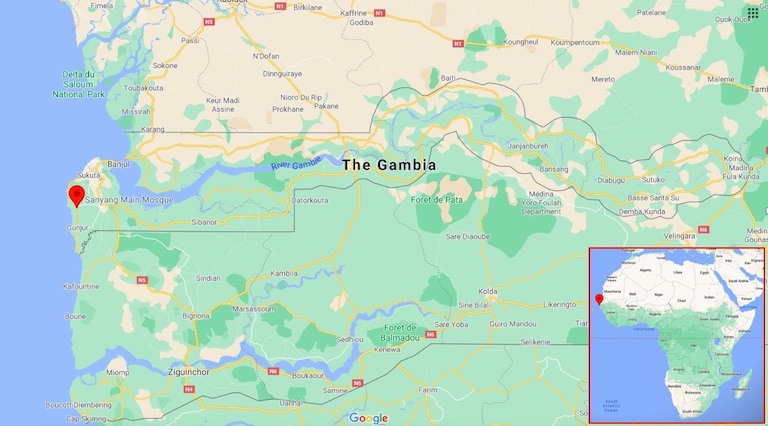 Sanyang, the Gambia. Image courtesy of Google Maps.
Sanyang, the Gambia. Image courtesy of Google Maps.
Following the unrest, 26 young men accused of being involved in the protests were charged and detained at Mile 2 prison. The detention center was infamous, partly for its terrible conditions, during the brutal 22-year dictatorship of former strongman Yahya Jammeh, and has yet to undergo significant reform.
The charges included “rioters demolishing buildings,” unlawful assembly, conspiracy to commit felony, and arson, which carries a potential life sentence. Hearings at the High Court in the capital Banjul concluded on April 19 with the release of 19 of the detained protesters on bail to face trial at a later date; the others were discharged. Meanwhile, the suspect in Ceesay’s killing awaits a court date at Mile 2.
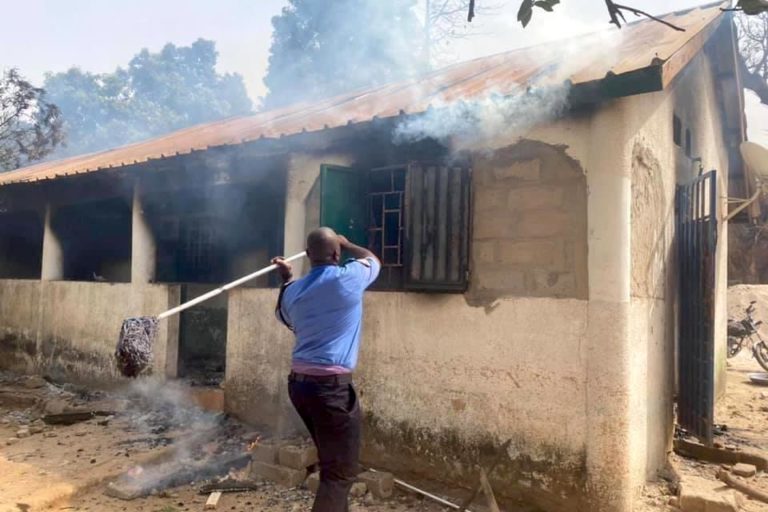 The Sanyang police station on fire during the March 15 protest. Image courtesy of Eye Africa TV.
The Sanyang police station on fire during the March 15 protest. Image courtesy of Eye Africa TV.
The extent of the destruction has divided public opinion. Some commentators on social media called the protest “wanton vandalism,” while others sympathized with the community’s ongoing struggles against the fishmeal factory.
“The situation in Sanyang, they’re not activists, they’re retaliators, I call them,” Dawda Saine, a marine biologist and the executive secretary of the National Association of Artisanal Fisheries Operators, told Mongabay. “What was destroyed amounted to more than hundreds of thousands of US dollars; it’s a very serious thing.
“The fishmeal plant was also part of the protest because only one person from Sanyang works at the plant, the rest are Chinese and Senegalese, so this was also a grudge,” added Saine, who said he disagreed with the destructive course taken by some protesters even though his organization opposes the fishmeal factories. “The action was not justifiable, the protesters should not have destroyed properties.”
Many campaigners argue it is the government’s lack of response to the community’s concerns that is causing the tinderbox conditions in Sanyang and other areas affected by fishmeal production.
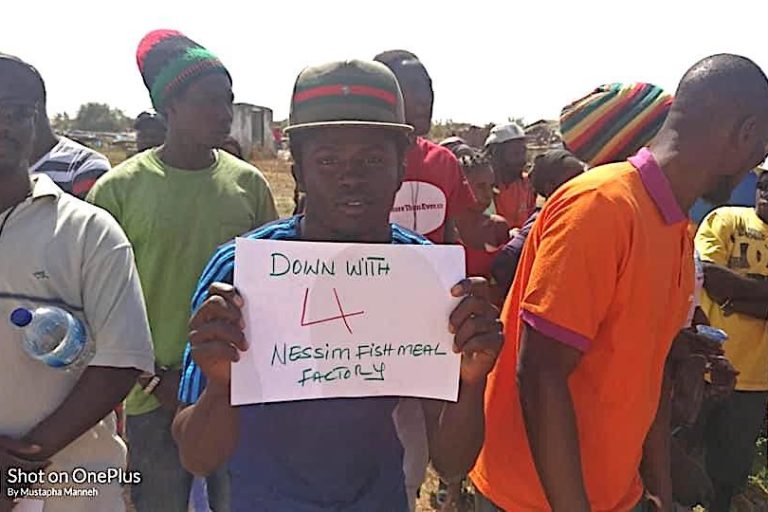 Protesters object to the Nessim fishmeal factory in in Sanyang in 2019. Image by Mustapha Manneh.
Protesters object to the Nessim fishmeal factory in in Sanyang in 2019. Image by Mustapha Manneh.
Campaigns in 2018 to shut the factories over pollution concerns led to the arrest of environmental activists. The National Environment Agency investigated the Golden Lead factory in Gunjur after a mangrove wildlife reserve turned red from algal blooms attributed to phosphate leaking from a broken wastewater outlet. The matter was settled with an out-of-court fine. Authorities temporarily closed the Nessim Trading factory in Sanyang and the country’s third factory, called JXYG, in the fishing village of Kartong, for inspections before allowing them to resume operations.
The presence of the fishmeal factories also drove away tourists prior to the COVID-19 pandemic, stripping away much-needed local jobs. “Those restaurants that employ lots of people are facing threats from the fishmeal factory, the factory smells sent all the tourists away,” said Jabang, the protester from Sanyang.
Now the pressing concern is over how the fishmeal industry is affecting food security and livelihoods.
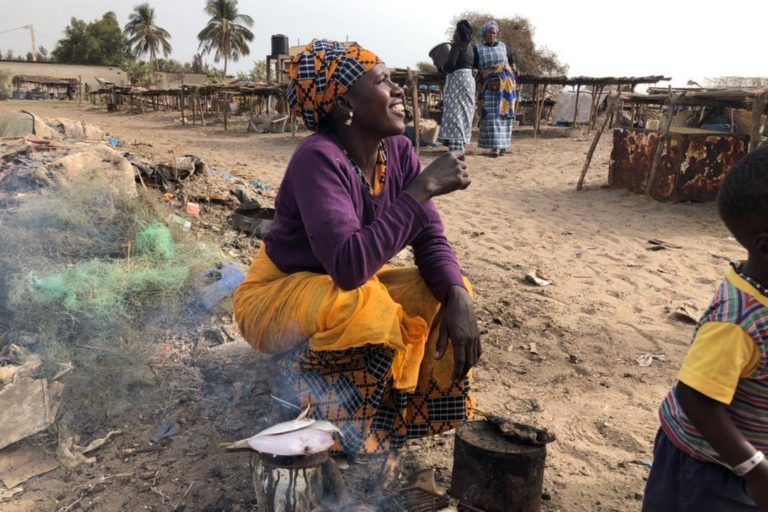 A fish smoker in Sanyang, the Gambia. Image by Mustapha Manneh.
A fish smoker in Sanyang, the Gambia. Image by Mustapha Manneh.
Greenpeace Africa warned [pdf] the U.N. Office of the High Commissioner for Human Rights (OHCHR) last May that the Gambia was particularly vulnerable to food insecurity as a result of fishmeal production, as fish contributes at least half of the country’s total animal protein intake.
The NGO, from its office in Dakar, Senegal, is campaigning against fishmeal and fish oil (FMFO) production, which its previous investigations have found is leading to overexploitation of small pelagic fish in the region. Its OHCHR briefing said 40 FMFO factories were operating in Mauritania, Senegal and the Gambia as of March 2019.
Greenpeace estimates that 4 to 5 kilograms (8.8 to 11 pounds) of fresh fish go into making 1 kg (2.2 lbs) of fishmeal and fish oil. “Most of these stocks are shared and migrate from Morocco to Guinea, so overfishing in one country has direct implications for fishermen in other countries,” its briefing notes.
A separate investigation into the FMFO supply chain in 2019 by Dutch NGO Changing Markets Foundation revealed that most of the fishmeal produced in this region is shipped to China for use in the animal feed and aquaculture markets. It found that the annual production from just one factory in the Gambia represented 40% of Gambia’s entire reported fish catch for a given year.
Watch: “Certified Sustainable” fish may not be as sustainable as marketed, according to Changing Markets Foundation’s 2019 report
Unsustainable levels of fishing not only affect the tens of thousands of artisanal fishers in the Gambia, whose population totals 2.3 million, but also those employed smoking and drying fish, who are predominantly women.
Fishing communities are also battling incursions by industrial trawlers into a marine conservation zone along the coast that is reserved for artisanal fishers. Saine told Mongabay that although it’s difficult to determine who the trawlers work for, most illegally caught bonga and sardinella are sold to fishmeal plants.
Poaching in the restricted zone usually occurs at night, he said. “At around 9 p.m. you see the trawlers coming in. Artisanal fishers’ nets are damaged; usually the fishermen lose their nets and there is no compensation,” Saine said.
Fishers have reported attacks by the trawler crews. Last year, fisher Musa Jammeh told China Dialogue that he and his crew were sprayed with scalding water after he approached a vessel that had cut his nets and tried to take down its registration numbers so he could make a compensation case.
In an effort to curb the problem of illegal, unreported and unregulated (IUU) fishing in the Gambia, the Ministry of Fisheries and Water Resources and the Gambian Navy are collaborating with the NGO Sea Shepherd on a patrol campaign. From August 2019 to November 2020, navy officers detained 22 vessels in the port of Banjul for violating fisheries regulations, the majority for incursions inside the restricted zone.
The ongoing campaign significantly reduces IUU fishing while Sea Shepherd is on patrol, Saine said, but incursions resume once its patrol boat leaves the Gambia’s waters, as the navy’s patrol capacity is limited.
Many activists criticize the ministry’s policy of dealing with the detained vessels through out-of-court settlements. “Nobody knows where the fine monies are going and even how much the fines are,” said Omar Sambou, a lecturer in environmental science and a resident of Sanyang. “So, there is no accountability about the fines imposed on these vessels.”
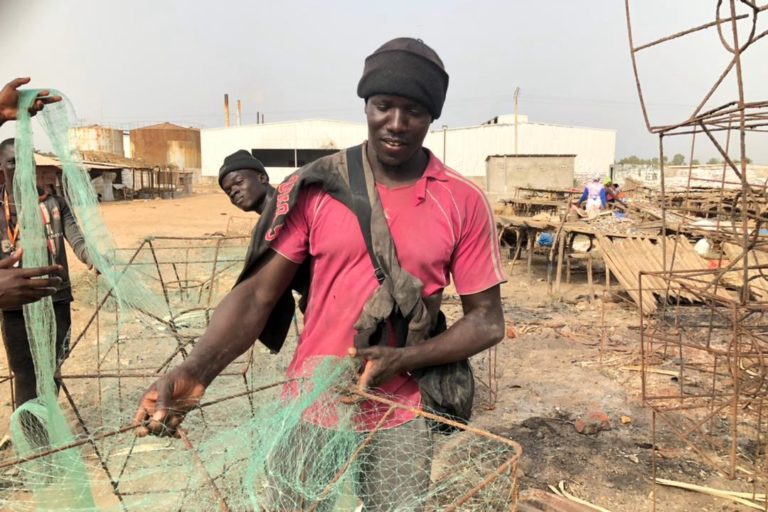 Fishers tend their gear in Sanyang. Image by Mustapha Manneh.
Fishers tend their gear in Sanyang. Image by Mustapha Manneh.
There is a belief among many Gambians that the government under President Adama Barrow has focused too much on growing foreign business investment, after inheriting a virtually bankrupt treasury from Jammeh in 2017. The fisheries minister, James Gomez, has previously dismissed concerns about overfishing and calls to close the fishmeal factories from affected communities, artisanal fishers and environmental activists.
But Sambou said this position is at the expense of the country’s natural resources. “Responsibility for our natural resources should be our main focus as a country. The fact is that they are exploiting our natural resources, exporting thousands of tons of fishmeal outside the Gambia week in week out,” he said, referring to the fishmeal factories.
Dawda Saine said he and members of the artisanal fishers’ association are investigating means to bring a legal case against the fishmeal factories over breaches of human rights. “We are trying to gather information to challenge the plants at the court level using the U.N. convention on the right to food, because, as far as I know, these fishmeal plants contravene the convention because they cause competition, they encourage overfishing and they cause illegal fishing. These are all principles we can use to challenge the fishmeal factories, so this is the next step, but we need to find a way to do this financially.”
The Minister of Fisheries and Water Resources and Nessim Trading did not respond to Mongabay’s requests for comment.
Banner image: A traditional fishing pirogue in Gunjur, the Gambia. Image by Mustapha Manneh.
Additional reporting by Mustapha Manneh, a Gambian journalist and activist, who interviewed Sanyang residents for this story. Manneh’s activism includes work on human rights and environmental issues, including opposition to the Gambian fishmeal industry.
FEEDBACK: Use this form to send a message to the editor of this post. If you want to post a public comment, you can do that at the bottom of the page.
Aquaculture, Environment, Fish, Fish Farming, Fisheries, Food, Food Crisis, food security, Governance, Human Rights, Illegal Fishing, Law Enforcement, Ocean Crisis, Oceans, Overfishing
Africa, Gambia, West Africa
Source link : https://news.mongabay.com/2021/04/a-fatal-stabbing-sends-a-gambian-fishing-village-into-turmoil-over-fishmeal/
Author :
Publish date : 2021-04-29 07:00:00
Copyright for syndicated content belongs to the linked Source.





